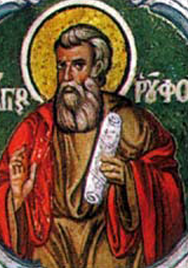Saint of the Day Online - St Rufus
Saint of the day online, Monday, December 18, 2017
18-12-2017
St Rufus and Zosimus were citizens of Antioch (or perhaps Philippi) who were brought to Rome with St. Ignatius of Antioch during the reign of Emperor Trajan.
There are several saints named Rufus, of which the Roman Martyrology records ten; historical mention is made of the following ones, which have liturgical feasts:
On 19 April, a group of martyrs in Melitene in Armenia, one of whom bears the name of Rufus. These martyrs are mentioned already in the Martyrologium Hieronymianum (ed. G. B. de Rossi-L. Duchesne, 46).
On 1 August, Rufus, with several companions who, according to the most reliable manuscripts of the "Martyrologium Hieronymianum" died at Tomi, the place being afterwards by mistake changed to Philadelphia (cf. Quentin, "Les martyrologes historiques", 337).
On 27 August, two martyrs named Rufus at Capua (see Rufus and Carpophorus) -- one, whose name also appears as Rufinus in the "Martyrologium Hieronymianum" (ed. cit., 111). The other is said to have suffered with a companion, Carponius, in Diocletian's persecution circa 304 AD (cf. "Bibliotheca hagiographica latina", II, 1070; Acta SS., VI August, 18-19).
On 25 September, several martyrs at Damascus, among them one named Rufus.
On 7 November, a Rufus of Metz, who is said to have been Bishop of Metz; his history, however, is legendary. His name was inserted at a later date in an old manuscript of the "Martyrologium Hieronymianum"(ed. cit., 140). In the ninth century his relics were transferred to Gau-Odernheim in Hesse, Diocese of Mainz.
On 28 November, a Roman martyr Rufus, probably identical with the Rufinianus who was buried in the Catacomb of Generosa on the Via Portuensis, and who is introduced in the legendary Acts of the martyrdom of St. Chrysogonus (cf. Paul Allard, "Histoire des persécutions", IV, 371 sq.).
On 18 December, the holy martyrs Rufus and Zosimus, who were taken to Rome with St. Ignatius of Antioch and were put to death there for their unwavering confession of Christianity during the persecution of Trajan. St. Polycarp speaks of them in his letter to the Philippians (c. ix).
They were condemned to death for their Christianity and thrown to wild beasts in the arena two days before the martyrdom of Ignatius. Feast Day December 18.